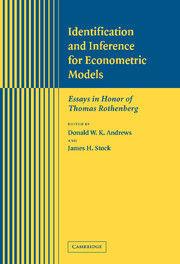Book contents
- Frontmatter
- Contents
- List of Contributors
- Preface
- Part I Identification and Efficient Estimation
- Part II Asymptotic Approximations
- Part III Inference Involving Potentially Nonstationary Time Series
- 15 Tests of the Null Hypothesis of Cointegration Based on Efficient Tests for a Unit MA Root
- 16 Robust Confidence Intervals for Autoregressive Coefficients Near One
- 17 A Unified Approach to Testing for Stationarity and Unit Roots
- 18 A New Look at Panel Testing of Stationarity and the PPP Hypothesis
- 19 Testing for Unit Roots in Panel Data: An Exploration Using Real and Simulated Data
- 20 Forecasting in the Presence of Structural Breaks and Policy Regime Shifts
- Part IV Nonparametric and Semiparametric Inference
18 - A New Look at Panel Testing of Stationarity and the PPP Hypothesis
Published online by Cambridge University Press: 24 February 2010
- Frontmatter
- Contents
- List of Contributors
- Preface
- Part I Identification and Efficient Estimation
- Part II Asymptotic Approximations
- Part III Inference Involving Potentially Nonstationary Time Series
- 15 Tests of the Null Hypothesis of Cointegration Based on Efficient Tests for a Unit MA Root
- 16 Robust Confidence Intervals for Autoregressive Coefficients Near One
- 17 A Unified Approach to Testing for Stationarity and Unit Roots
- 18 A New Look at Panel Testing of Stationarity and the PPP Hypothesis
- 19 Testing for Unit Roots in Panel Data: An Exploration Using Real and Simulated Data
- 20 Forecasting in the Presence of Structural Breaks and Policy Regime Shifts
- Part IV Nonparametric and Semiparametric Inference
Summary
ABSTRACT
This paper uses a decomposition of the data into common and idiosyncratic components to develop procedures that test if these components satisfy the null hypothesis of stationarity. The decomposition also allows us to construct pooled tests that satisfy the cross-section independence assumption. In simulations, tests on the components separately generally have better properties than tests on the observed series. However, the results are less than satisfactory, especially in comparison with similar procedures developed for unit root tests. The problem can be traced to the properties of the stationarity test, and is not due to the weakness of the common-idiosyncratic decomposition. We apply both panel stationarity and unit root tests to real exchange rates. We find evidence in support of a large stationary common factor. Rejections of PPP are likely due to nonstationarity of country-specific variations.
INTRODUCTION
A notable result of Rothenberg (2000) and Elliott, Rothenberg and Stock (1996), is that for data with sample sizes frequently encountered, the maximal achievable power of unit root tests is rather low. There is now a growing interest in using panel data to perform unit root and stationarity analysis. One of the major motivations for using panel data for hypothesis testing is the enhanced power relative to a single time series. But most of the panel tests in the literature assume cross-sectional independence, which is difficult to satisfy for macroeconomic data. As discussed in O'Connell (1998), panel unit root tests tend to be oversized, while stationarity tests have low power.
Information
- Type
- Chapter
- Information
- Identification and Inference for Econometric ModelsEssays in Honor of Thomas Rothenberg, pp. 426 - 450Publisher: Cambridge University PressPrint publication year: 2005
Accessibility standard: Unknown
Why this information is here
This section outlines the accessibility features of this content - including support for screen readers, full keyboard navigation and high-contrast display options. This may not be relevant for you.Accessibility Information
- 17
- Cited by
